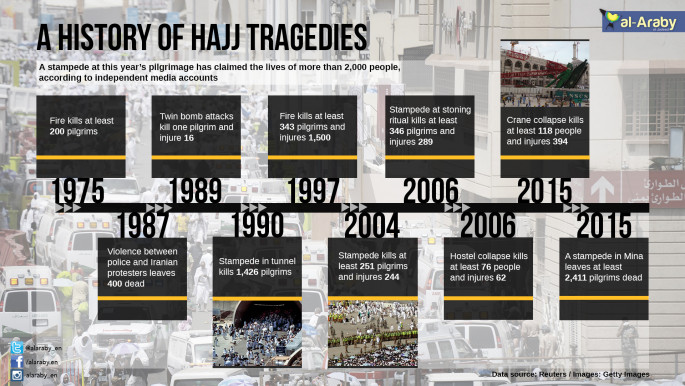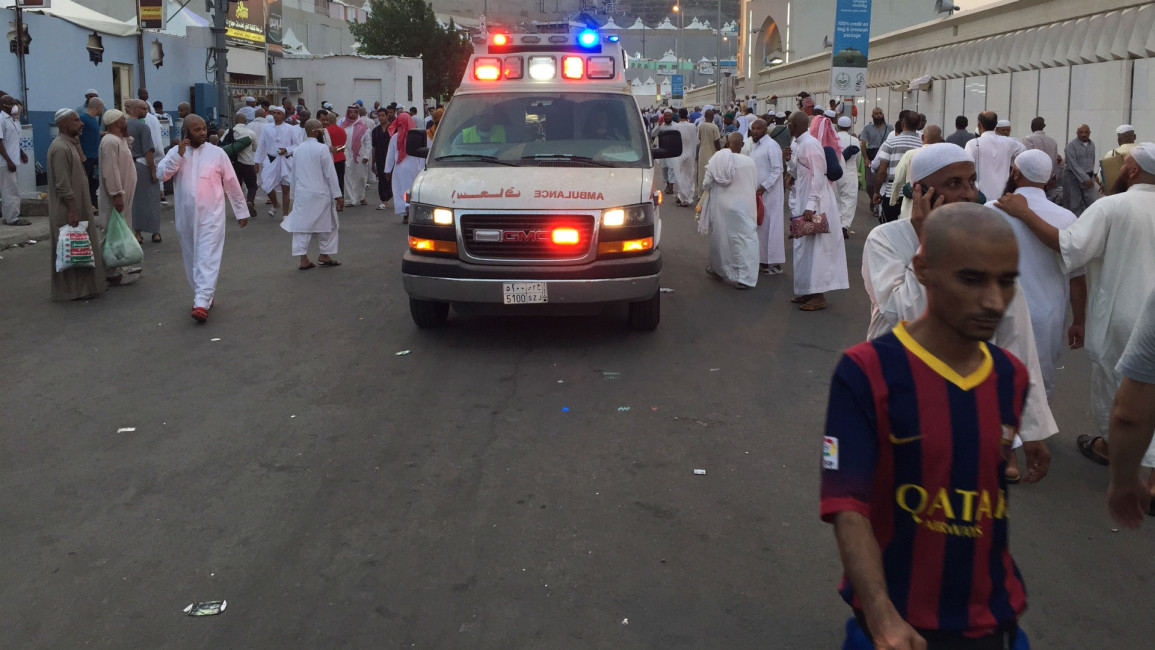Hajj death toll rises to 769, Iran demands apology
Iran criticised Saudi Arabia on Sunday over the disaster at the hajj pilgrimage, demanding an apology and accusing its rival of seeking to evade blame, while Riyadh in turn accused Tehran of playing politics with the disaster.
On Saturday, Saudi authorties said on Twitter that the toll from the disaster stood at 769 pilgrims killed and 934 injured, updating previous figures. It did not provide the nationalities of the dead and injured.
But Iranian state TV said 136 Iranian pilgrims were among the dead and 85 were injured, while 344 Iranians remain missing.
It also says a former ambassador to Lebanon, as well as two Iranian state TV reporters and a prominent political analyst are among those still missing. The semi-official Fars news agency said a former ambassador to Slovenia was among the dead.
Iranian Supreme Leader Ayatollah Ali Khamenei said Muslim countries should demand Saudi Arabia be held to account for the deaths. The kingdom presents itself as the guardian of orthodox Islam and custodian of its holiest places in Mecca and Medina.
"Instead of blaming this and that, the Saudis should accept the responsibility and apologise to the Muslims and the victims' families," Khamenei was quoted as saying on his own website.
"The Islamic world has a lot of questions. The death of more than 1,000 people is not a small issue. Muslim countries should focus on this," Khamenei said. Other Iranian officials have also alleged the total death toll is more than 1,000.
Thursday's disaster, the worst to befall the hajj in 25 years, happened when two large groups of pilgrims collided at a crossroads in Mina, a few kilometres east of Mecca, on their way to performing the "stoning of the devil" ritual at Jamarat.
Iran 'playing poilitcs'
Speaking in New York, Saudi Foreign Minister Adel al-Jubeir accused Iran of exploiting the tragedy for political purposes.
"This is not a situation with which to play politics," he said before meeting US Secretary of State John Kerry on Saturday. "I would hope that the Iranian leaders would be more sensible and more thoughtful with regards to those who perished in this tragedy and wait until we see the results of the investigation."
Saudi newspaper al-Hayat reported Iranian Foreign Minister Mohammad Jawad Zarif had verbally asked to meet Jubeir on the sidelines of the UN General Assembly but his request was rejected because the request "came in an arrogant way and out of place".
Iranian Minister of Culture Ali Janati, assigned to probe the disaster, was quoted by Fars news agency as confirming that Zarif had asked to meet Jubeir but the request was rejected.
Iran has summoned the Saudi charge d'affaires three times to ask Riyadh for more cooperation over the incident.
"The reports show that Saudis are responsible for this incident by their mismanagement and negligence," Ali Larijani, Iranian parliament speaker was quoted as saying by Tasnim news agency.
"Under international law, this incident is absolutely subject to prosecution," Iran's State Prosecutor Ebrahim Raisi told state TV.
He claimed Saudi authorities blocked a road used by pilgrims to allow a royal convoy to pass through, causing the deadly convergence in the town of Mina on the outskirts of Mecca.
Neither Iran nor Saudi Arabia is a state party to the International Criminal Court, and only the court's prosecutor can file charges. Iran could try to file a case at the International Court of Justice, which handles disputes between nations but does not mete out criminal justice.
Saudi Arabia has not responded to the Iranian accusations regarding the convoy. Saudi Interior Ministry spokesman Maj. Gen. Mansour al-Turki told The Associated Press that a VIP convoy traveling through Mina on Thursday, which
| Iran and Saudi Arabia are bitterly divided on a host of regional issues and support opposite sides in the wars raging in Syria and Yemen. |
included foreign dignitaries, had nothing to do with the incident and was in a different part of town. He said VIPs use their own roads in Mina.
Iran and Saudi Arabia are bitterly divided on a host of regional issues and support opposite sides in the wars raging in Syria and Yemen. The accusations of mismanagement of the pilgrimage strike at a key pillar of the Saudi royal family's prestige, King Salman holds the title of the "custodian of the two holy mosques."
Iran's President Hassan Rouhani began an address to the UN General Assembly on Saturday by expressing "regret over the heart-rending incident," emphasising the "need for swift attention" to an investigation into "this incident and other similar incidents in this year's hajj."
Rouhani told a group of editors Friday that both the stampede and the collapse of a crane on the Grand Mosque in Mecca earlier this month which killed another 111 people suggested "ineptitude" on the part of Saudi authorities.
The hajj is one of the five pillars of Islam, and all able-bodied Muslims are required to make the pilgrimage to Mecca at least once in their lives.
On Saturday, the final day of the hajj, pilgrims streamed into Mina's Jamarat, a multi-story complex with crowd-monitoring technology and wide ramps for large crowds to perform the final rites of the pilgrimage.
Saudi security forces were on hand to spray pilgrims with water to help keep them cool as temperatures reached 100 degrees Fahrenheit (38 degrees Celsius). Large fans were also set up to spread mist.
Sudanese pilgrim Abdullah al-Muzbahi, 42, stood to the side in Jamarat with his hands outstretched in supplication and prayer after completing the stoning ritual. He said that from his perspective, this year's hajj went smoothly and that Saudi officials appeared to be doing all they could to safely manage the pilgrimage.
Saudi pilgrim Misfir al-Yami, 28, said the large crowds should be directed better to reach certain holy sites in smaller waves. He said it is the responsibility of both the security forces and the pilgrims to ensure the hajj is safe.
Syrian pilgrim Samar Zaki, 37, said there were times when she was in the midst of very large crowds that she worried for her safety.
"There are times when it is challenging," she said. "I saw (news) about the accident that took place and it made us all very upset." 



